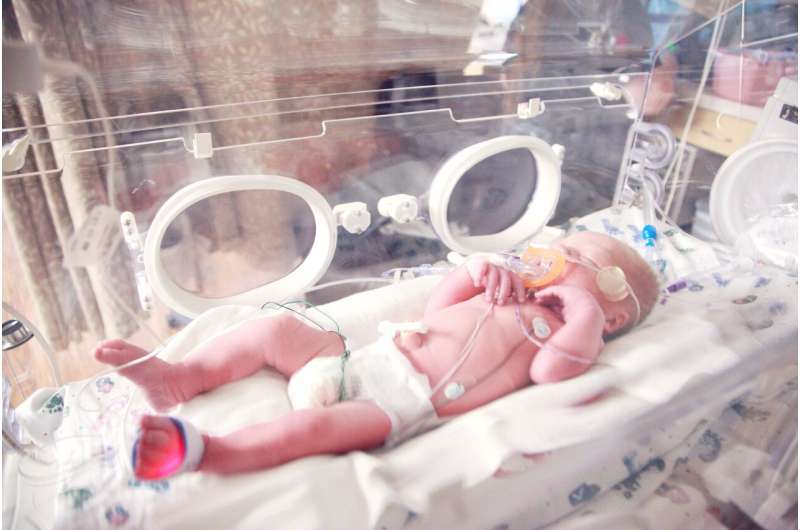This article has been reviewed according to Science X's editorial process and policies. Editors have highlighted the following attributes while ensuring the content's credibility:
fact-checked
proofread
Earlier transfer to specialized care associated with better outcomes for neonates with opioid withdrawal syndrome

A new study sheds light on two factors that affect the outcomes for infants with neonatal opioid withdrawal syndrome (NOWS). The article, "Transfer timing and the length of medication weaning for neonatal opioid withdrawal," was published open access by Hospital Pediatrics on May 15, 2023. The authors are a multidisciplinary team of New Jersey researchers and clinicians from Kessler Foundation and Children's Specialized Hospital.
Opioid abuse remains a major public health problem, with an increasing number of newborns affected by NOWS, a complex syndrome associated with increased risks for infection, sleep disturbances, and vision, motor, cognitive and behavioral difficulties. Infants with severe symptoms who are transferred to a NICU setting for clinical management of NOWS symptoms may then require further treatment for medication weaning.
Evidence shows that nonpharmacological interventions delivered in an individualized setting safely support medication weaning and healthy neurodevelopment. However, there is a lack of consensus on guidelines for transferring these young patients to specialized care settings for NOWS.
The team conducted a single-site retrospective cohort study of infants with NOWS transferred to Children's Specialized Hospital for medication weaning from May 2016 to June 2021. A total of 92 infants were transferred from NICUs at 14 hospitals; complete data were available for 87 infants for analysis. The primary outcome measure was length of weaning, calculated by the number of days from transfer through the last day of medication treatment plus two days for observation.
The majority of infants (62%) were transferred after their 15th day of life; 38% were transferred earlier, on or before their 14th day of life. Duration of weaning was 20.8 days for the later transfer group, and 14.2 days for the earlier transfer group. Weaning was prolonged among infants with severe NOWS symptoms and prenatal exposure to psychotropic medications.
Treatment at the specialized pediatric inpatient unit includes a range of nonpharmacologic interventions that are increasingly recognized as critical to clinical outcomes, according to Melissa G. Smith, MS, CCC-SLP, C/NDT, Clinical Lead for Inpatient Therapies at Children's Specialized Hospital.
"The inpatient unit provides a low stimulation setting where nonpharmacologic interventions−such as graded touch, swaddling, holding, rocking, and pacifier use−are utilized based on each infant's needs and abilities to eat, sleep, and self soothe," she explained.
"Interventions that foster parental bonding, including breastfeeding/feeding, caregiving, and rooming-in, are also associated with positive outcomes. By examining the impact of timing of transfer, this study furthers our knowledge of NOWS and provides preliminary evidence to inform practice guidelines that shorten hospital stays, and minimize medication use and separation from caregivers," Smith concluded.
This single site study had acknowledged limitations, namely in that the investigators were unable to obtain data on the factors related to the initiation of pharmacologic therapy at the referring hospitals, and how those factors influence the timing of transfer to a pediatric inpatient setting for NOWS management.
"Our findings show that earlier referral to a pediatric inpatient unit that can provide the environmental supports that these babies need may be beneficial for babies with NOWS," explained Amanda L. Botticello, Ph.D., MPH, director of the Center for Outcomes and Assessment Research at Kessler Foundation, and vice chair for research education at Rutgers New Jersey Medical School.
"Earlier transfer was associated with shorter length of weaning, which means shorter hospital stays and less exposure to medication," she said. "We also found an association between prenatal exposure to opioids and psychotropic medications and severe NOWS. Weaning was prolonged for these infants," Dr. Botticello added, "indicating that early, intensive interventions may be warranted for this high-risk subgroup."
More information: Amanda L. Botticello et al, Transfer Timing and the Length of Medication Weaning for Neonatal Opioid Withdrawal Syndrome, Hospital Pediatrics (2023). DOI: 10.1542/hpeds.2022-006863



















